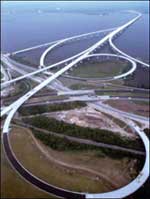















Successes in Stewardship: June 2002 |
|---|

|
Federal Highway Administration
June 2002
North Carolina's Solution: Good Mitigation, Faster Permits, Better Water Quality
As an environmental streamlining laboratory, North Carolina will promote environmental stewardship, improve the quality of the state's transportation services and environment, better meet customer needs, and further build trusted partnerships among state and Federal transportation and resource agencies. North Carolina will accomplish these goals by developing and implementing specific tasks and activities focused on the effective and efficient integration of transportation and environmental decision-making. The results of the laboratory will be applicable to future projects.
To develop common goals and initiatives related to environmental streamlining and stewardship, the North Carolina Department of Transportation (NCDOT) is partnering with the following agencies:

The Neuse River Bridge in New Bern, North Carolina, was designed and constructed to minimally impact the natural and human environment.
(NCDOT image)
The initiatives developed are integral components of the streamlining laboratory concept and include:
NCDOT is partnering with NC DENR, the Wilmington District USACE, and other state and Federal agencies to fundamentally change the way mitigation is conducted in the state. The Ecosystem Enhancement Program (EEP), NCDOT's new, proposed flexible mitigation approach, will allow mitigation needs to be brought forward earlier in the process. EEP is watershed based and will measurably improve water quality by using a functional, non-site specific replacement of impacts and by targeting degraded watersheds for improvement.
Currently, mitigation plans in North Carolina must be approved before the necessary permits are issued. The mitigation process often occurs late in the planning process and on a project-by-project basis, resulting in delays. The current mitigation process also lacks a functional replacement of impacts, an understanding of watershed needs, and consistent guidance from state and Federal resource agencies. EEP will address and remedy these issues.
Encouraged by the Michigan Department of Transportation's process improvement methodology (described in the November 2001 Successes in Stewardship newsletter), NCDOT met last year with NC DENR, USACE, the U.S. Fish and Wildlife Service, and other state and Federal transportation and resource agencies for two, one-week workshops in order to improve the Clean Water Act Section 404 permitting process. Participating agencies analyzed the challenges associated with the current permitting process, developed a new permitting process map, and outlined working-level implementation details.
Under the new permitting process, environmental issues and needs, including potential impacts, are identified and considered earlier in the project development and design process. Up-front compensatory mitigation is developed for project impacts, allowing the permitting process to continue without delays. The new permitting process will reduce costs and prevent redesigns and duplication of work through early coordination and predictable process and documentation requirements.
Lessons LearnedNCDOT senior leadership support of environmental streamlining garnered similar support from resource agencies and resulted in an invitation to become a Federal TEA-21 Environmental Streamlining Laboratory. As a TEA-21 Environmental Streamlining Laboratory, North Carolina can demonstrate new process improvements, particularly in mitigation and permitting. To be successful in North Carolina, watershed based mitigation requires a shift from wetland ratio replacement to a defined and functional classification system. Implementing flexible mitigation approaches at the watershed level targets degraded water resources for improvement, enhancing water quality. |
NCDOT's History of Environmental StewardshipSince 1998, NCDOT has promoted environmental stewardship internally.
|
Twenty-one states have registered environmental stewardship demonstrations, including NC. To learn more about these projects, visit:
http://http://itre.ncsu.edu/aashto/stewardship/"Successes in Stewardship" is a Federal Highway Administration newsletter highlighting current environmental streamlining practices from around the country. To subscribe, contact Cassandra Allwell at (617) 494-3997 or allwell@volpe.dot.gov
For more information on environmental streamlining, please visit: http://www.fhwa.dot.gov/environment/strmlng/index.asp.
